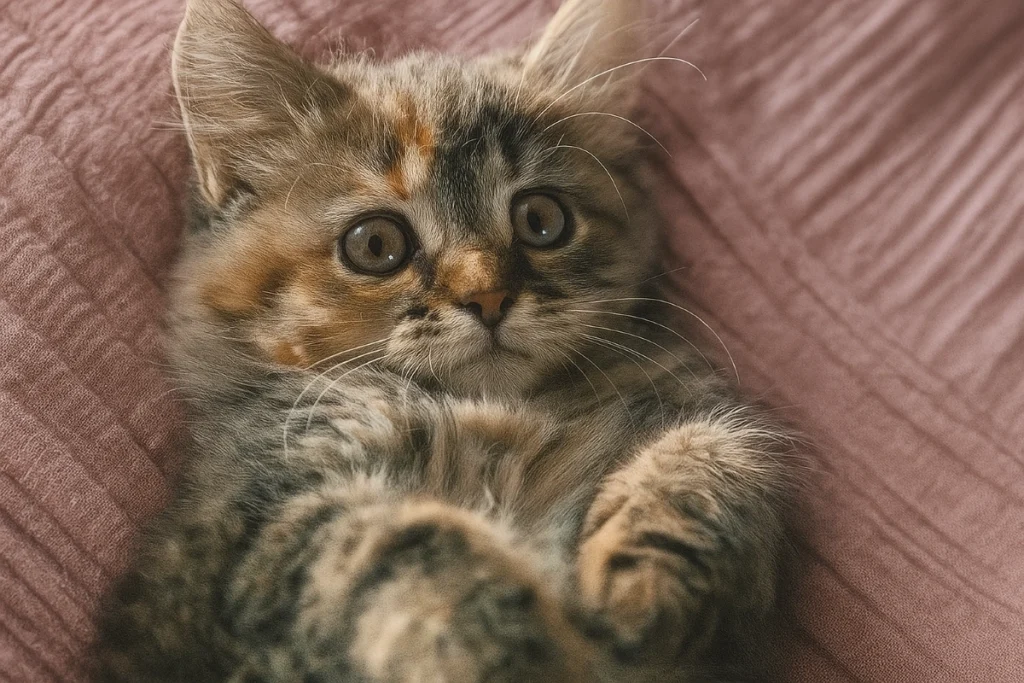What Causes Bad Cat Breath And Should You Be Concerned?
By: Elizabeth Rikas

The information in this article is intended to educate cat parents and is not a substitute for veterinary guidance. In case of any concerns about your cat’s health, please talk with your veterinarian.
When a cat’s breath smells like fish, it could indicate dental issues, bacteria buildup, or even dietary choices. A cat’s breath should not have a strong odor. Pet owners should pay attention to any changes in their cat’s breath, as it can be a sign of underlying health problems.
Many factors can contribute to this unpleasant smell. Poor oral hygiene may lead to plaque and tartar buildup, creating an environment for bacteria to thrive. Additionally, a diet high in fish could leave lingering odors.
Regular dental care is essential for maintaining fresh breath in cats. This includes dental check-ups and appropriate diets. Being aware of the signs of oral problems can ensure that cat owners provide the best care for their furry companions.
Key Takeaways:
- Fishy breath often signals dental issues or poor oral hygiene.
- Maintaining regular dental care is critical for a cat’s health.
- A cat’s diet can influence the smell of its breath.
Click to explore: Is Beef Liver Good For Cats?
Common Causes of Feline Bad Breath
Cat bad breath, especially when it smells like fish, can be caused by several factors. These include diet and oral hygiene, dental issues like periodontal disease, systemic conditions such as kidney disease, and other health complications. Each cause impacts oral health and overall well-being.
Diet and Oral Hygiene
The diet that a cat consumes significantly influences its breath. Cats that eat wet food, particularly those with strong scents like fish, may have breath that reflects those flavors. Poor quality or inappropriate diets can lead to leftover food particles, promoting bacterial growth in the mouth.
Regular dental care is essential. Brushing a cat’s teeth can help reduce the buildup of plaque and tartar. Without proper oral hygiene, bacteria thrive. This buildup is a prime cause of bad breath.
Periodontal Disease and Dental Problems
Periodontal disease is a common issue in cats. When tartar accumulates near the gum line, it can lead to infections. These infections can produce foul-smelling breath. Signs of dental problems include swollen gums, bleeding, and difficulty eating.
Cats with untreated dental disease may also have pain, which can affect their eating habits. Regular veterinary dental check-ups can help identify and treat these issues early. Maintaining a cat’s dental health is crucial for preventing bad breath.
Kidney Disease and Its Effects
Kidney disease can cause distinct changes in a cat’s breath. When the kidneys are not functioning well, toxins build up in the bloodstream. This buildup can lead to a fishy breath odor.
Cats suffering from kidney disease may also show other symptoms, such as increased thirst, urination, and weight loss. Regular veterinary visits can help catch kidney issues early. Understanding these symptoms can assist owners in seeking timely care.
Other Health Issues
Several other health problems can affect a cat’s breath. Liver disease is one example. When the liver is compromised, it can lead to a buildup of toxins, causing distinct odors.
Respiratory issues or infections can also contribute to bad breath. These conditions may lead to nasal discharge or an inability to smell food properly, further impacting overall health. Regular vet check-ups are vital so that these conditions can be monitored effectively.
By addressing these common causes, cat owners can better manage their pet’s health and reduce unpleasant odors.
Click to explore: How To Make Cats’ Fur Softer
Tackling Cat Dental Problems
Maintaining good dental hygiene is essential for a cat’s overall health. Addressing issues like tartar and plaque buildup can help prevent more serious dental problems such as gingivitis.
Importance of Dental Hygiene
Regular dental care is key to preventing bad breath and serious health issues in cats. Poor dental hygiene can lead to the buildup of plaque, which can harden into tartar. This buildup can cause gingivitis, an inflammation of the gums. If left untreated, it can progress to periodontal disease, affecting not just the mouth but the cat’s overall health.
To promote good dental hygiene, cat owners should consider routine brushing, dental treats, and chew toys designed to clean teeth. Regularly checking a cat’s mouth for signs of trouble can also help detect problems early.
Treating Tartar and Plaque Build-Up
Tartar and plaque can be treated effectively with a combination of home care and professional help. At home, brushing a cat’s teeth several times a week is ideal. Owners should use special cat toothpaste, as human toothpaste can be harmful.
For cats that resist brushing, dental treats and water additives can help reduce plaque. Products like enzymatic toothpaste can effectively break down tartar and plaque. For heavier buildup, a professional dental cleaning may be necessary.
For cats that resist brushing, dental treats and water additives can help reduce plaque. Products like enzymatic toothpaste can effectively break down tartar and plaque. For heavier buildup, a professional dental cleaning may be necessary.
Veterinary advice on the best products and methods is invaluable. Consistent attention to these issues minimizes health risks and keeps a cat’s mouth healthy.
Professional Veterinary Care
Regular veterinary check-ups are important for managing dental health. A veterinarian can assess the condition of a cat’s teeth and gums, checking for signs of gingivitis or periodontal disease. Early detection is crucial for effective treatment.
Professional cleanings may be recommended to remove tartar that regular brushing cannot tackle. Depending on the severity of the dental problems, the vet may also suggest extractions or other procedures.
Veterinarians also provide guidance on maintaining oral health at home, ensuring cats enjoy a lifetime of good dental hygiene. Regular visits, paired with at-home care, can greatly enhance a cat’s quality of life.
Click to learn about: Split Claws In Cats
Systemic Health Issues and Halitosis
Halitosis, or bad breath, in cats can often be linked to underlying systemic health problems. Identifying these issues early can help in managing both the bad breath and the associated health risks. Here are some important factors to consider.
Liver and Kidney Implications
Liver and kidney diseases can significantly impact a cat’s breath odor. In cases of kidney disease, waste products like urea and ammonia build up in the bloodstream. This can lead to a breath that smells like urine or fish.
Similarly, liver disease may produce a foul odor due to the organ’s role in detoxifying the body. As the liver fails to function properly, toxins accumulate, leading to changes in breath. Regular veterinary check-ups can help detect these conditions early and ensure better management of the cat’s health.
Click to explore: Can Cats Eat Pumpkin?
Diabetes and Oral Health
Diabetes is another systemic issue that may cause halitosis. When a cat has diabetes, high blood sugar levels can lead to changes in the mouth. This may allow bacteria to multiply, contributing to bad breath.
Moreover, diabetic cats may experience periodontal disease more frequently. This condition results from inflammation of the gums and can further worsen halitosis. Treating diabetes effectively often involves insulin therapy, proper diet, and regular dental care to help maintain oral health and fresh breath.
Click to know: Siberian Cat Size Comparison
Dehydration and Anal Gland Issues
Dehydration can also lead to bad breath. Cats that do not drink enough water may suffer from dry mouths. A dry mouth decreases saliva production, which is essential for washing away food particles and bacteria. This can result in an unpleasant odor in their breath.
Additionally, anal gland issues can sometimes contribute to foul-smelling breath. If a cat’s anal glands are impacted or infected, it can lead to the release of strong odors. These odors can stick to the cat’s mouth and cause halitosis. Regular monitoring and consultation with a veterinarian can help address these matters promptly.
Frequently Asked Questions
Fishy-smelling breath in cats can raise many questions for pet owners. Here are some common inquiries regarding this issue, including its causes, treatments, and health implications.
Conclusion
A cat’s breath smelling like fish can be more than just an unpleasant odor—it often signals underlying health or dental issues. From poor oral hygiene and dietary choices to serious conditions like kidney disease, understanding the root cause is crucial for effective care. Regular dental check-ups, proper diet, and vigilant monitoring can help ensure your feline friend stays healthy and fresh.
By addressing these concerns early, cat owners can prevent minor issues from escalating into major health problems. A proactive approach to dental care and overall wellness not only improves your cat’s breath but also enhances their quality of life. Stay attentive to changes in your cat’s breath—it’s a small clue that can make a big difference.

About the Author
Elizabeth Rikas
Elizabeth is a passionate advocate for feline health and well-being, drawing from her years as a dedicated pet parent to three cats—Gypsy, Swan, and Alfred—and her invaluable experience volunteering at animal shelters. A seasoned writer with a lifelong love for cats, Elizabeth began sharing her insights in her teens and has since contributed extensively to platforms focused on feline care. Through her expertise and heartfelt dedication, she empowers pet owners with practical advice and research-backed knowledge to nurture their furry companions.
